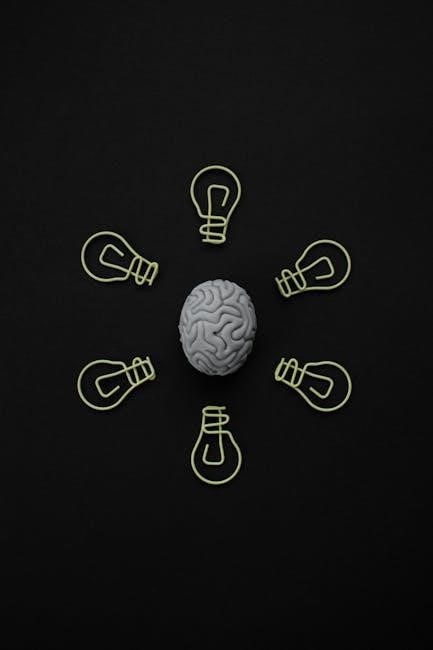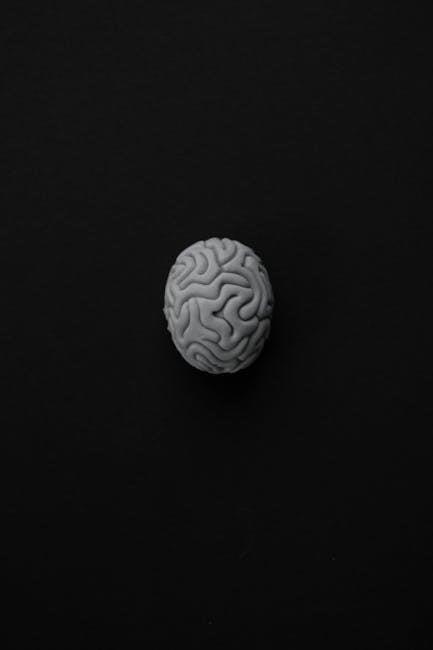
Myers Psychology for AP, 2nd Edition, by David G. Myers and C. Nathan DeWall, is a comprehensive textbook designed for AP Psychology courses. It integrates current research, interactive digital formats, and real-world applications to enhance learning. The book is known for its engaging storytelling and data-driven approach, making it a valuable resource for students preparing for the AP exam.
1.1 Overview of the Textbook
Myers Psychology for AP, 2nd Edition, co-authored by David G. Myers and C. Nathan DeWall, is a widely acclaimed textbook tailored for AP Psychology courses. It provides a comprehensive exploration of psychological concepts, theories, and research, aligning with the AP course framework. The textbook is organized into modular units, each focusing on specific topics like research methods, biological bases of behavior, and developmental psychology. With engaging storytelling, real-world applications, and a focus on data-driven analysis, this edition offers a student-friendly approach. It is available in both print and digital formats, making it accessible for diverse learning preferences. The text is supported by additional resources, including practice questions and study guides, to aid student success.
1.2 Importance of the 2nd Edition
The 2nd Edition of Myers Psychology for AP is a significant update, offering enhanced content and features tailored to meet the evolving needs of AP Psychology students. It incorporates the latest research and aligns with the 2024 College Board Course and Exam Description (CED), ensuring relevance and accuracy. The edition introduces new modules, improved digital accessibility, and expanded practice questions, providing students with robust tools for exam preparation. Its focus on current trends and real-world applications makes it an essential resource for understanding psychological principles and excelling in the AP exam. This edition reflects the authors’ commitment to fostering a deeper understanding of psychology while supporting academic success.
1.3 Key Features of the Textbook
The 2nd Edition of Myers Psychology for AP offers several key features that enhance learning and preparation for the AP exam. It includes updated modules aligned with the AP Course Framework, clear learning objectives, and module-ending assessments to reinforce understanding. The textbook integrates real-world applications, engaging storytelling, and data-driven insights to make psychology relatable and memorable. Additional resources such as practice questions, study guides, and digital formats provide students with flexible learning options. The inclusion of instructor support materials and online resources further enhances its value, making it a comprehensive and accessible tool for mastering AP Psychology.

Structure and Organization of the Textbook
The textbook is organized into modules with a logical flow, starting from foundational concepts to advanced topics, ensuring comprehensive coverage of AP Psychology content.
2.1 Modular Approach
The Myers Psychology for AP, 2nd Edition, employs a modular approach, dividing content into manageable units. Each module focuses on specific topics, allowing students to grasp concepts systematically. This structure aligns with the AP course framework, ensuring all key areas are covered. The modularity aids in organizing study materials, making it easier for students to review and retain information. Additionally, the digital version offers flexible access, enabling learners to navigate through modules efficiently. This approach supports active learning, helping students prepare thoroughly for exams and deepen their understanding of psychology.
2.2 Learning Objectives and Outcomes
The Myers Psychology for AP, 2nd Edition, is structured with clear learning objectives at the beginning of each module, aligning with the AP Course Framework. These objectives guide students through key concepts and skills, ensuring they understand what they need to learn. The outcomes are measurable, allowing students and instructors to track progress effectively. Each module concludes with formative assessment questions to reinforce understanding and prepare for exams. This focused approach ensures students master the material, making it easier to succeed in the AP Psychology course and exam. The textbook’s design supports active learning, critical thinking, and application of psychological principles.
2.3 Integration of AP Course Framework
The 2nd Edition of Myers Psychology for AP is meticulously aligned with the AP Course Framework, ensuring a seamless connection between the textbook and course requirements. Each module corresponds to specific units and topics outlined in the framework, providing structured coverage of essential concepts. The integration ensures that students develop a deep understanding of psychological theories, methods, and applications as mandated by the College Board. This alignment also supports instructors in teaching the curriculum effectively, making the textbook a reliable resource for both teaching and learning. By closely following the framework, the book prepares students for the AP Psychology exam while fostering critical thinking and analytical skills.
Key Topics Covered in the Textbook
The textbook covers a wide range of topics including research methods, biological bases of behavior, sensation, perception, learning, memory, motivation, emotion, developmental psychology, and personality disorders.
The textbook begins with an engaging introduction to psychology, defining it as the scientific study of behavior and mental processes. Myers and DeWall use storytelling and real-world examples to capture students’ interest. This section explores the origins of psychology, key concepts, and the scientific method. It emphasizes the relevance of psychology in understanding human behavior, cognition, and emotion. The chapter also highlights the importance of critical thinking and ethical considerations in psychological research. With clear explanations and relatable content, this introduction sets a strong foundation for students to explore the field further. The authors’ approach makes complex concepts accessible and interesting.
3.2 Research Methods in Psychology
The textbook thoroughly explores research methods in psychology, emphasizing the scientific approach to understanding behavior and mental processes. Myers and DeWall explain various research designs, including experiments, surveys, and case studies, while highlighting the importance of ethical considerations. The chapter provides clear examples of how psychologists collect and analyze data, as well as the limitations and strengths of different methodologies. Students learn to critically evaluate research studies and apply these methods to real-world scenarios. The authors also emphasize the role of replication and peer review in ensuring the validity of psychological research. This section equips students with a solid foundation for conducting and interpreting psychological research effectively.
3.3 Biological Bases of Behavior
The textbook delves into the biological foundations of behavior, exploring the nervous system, brain structures, and neurotransmitters. It explains how biological processes influence perception, cognition, and emotion. Myers and DeWall discuss the role of hormones, genetics, and neuroplasticity in shaping behavior. The chapter also covers the effects of biological rhythms and sleep on psychological functioning. Practical examples and case studies illustrate how biological factors interact with environmental influences. This section provides a comprehensive understanding of the physiological underpinnings of human behavior, preparing students to analyze the interplay between biology and psychology in various contexts.
3.4 Sensation and Perception
This chapter explores how we process sensory information and interpret it to create our experiences of the world. Myers and DeWall discuss thresholds, including absolute and difference thresholds, and examine the complexities of vision, hearing, and other senses. The section delves into perceptual processes, such as how the brain organizes sensory data through bottom-up and top-down processing. It also covers theories of perception, including gestalt principles and the role of expectations and context. Practical examples and illusions illustrate how perception can be influenced by psychological and environmental factors, making this chapter a cornerstone for understanding how we construct reality from sensory input.
3.5 Learning and Memory
This chapter delves into the mechanisms of learning and memory, essential for understanding human behavior. Myers and DeWall explain classical conditioning, introduced by Pavlov, and operant conditioning, developed by Skinner, highlighting how behaviors are acquired through associations and reinforcements. The section also explores memory processes, including encoding, storage, and retrieval, with insights into short-term and long-term memory. The Atkinson-Shiffrin memory model is discussed, along with strategies to enhance memory retention. Practical applications, such as techniques for improving study habits, are emphasized. The chapter bridges psychological theories with real-world scenarios, making complex concepts accessible and engaging for AP students preparing for exams.
3.6 Motivation and Emotion
The chapter on motivation and emotion explores the driving forces behind human behavior and the psychological states that accompany them. Myers and DeWall discuss theories of motivation, including Maslow’s hierarchy of needs and self-determination theory, emphasizing intrinsic and extrinsic motivators. The section also delves into emotional experiences, explaining the James-Lange theory and the two-factor theory of emotion. Practical examples illustrate how motivation and emotion influence daily life, such as achieving goals or coping with stress. The authors provide insights into cultural differences in emotional expression and the role of emotions in decision-making. This chapter offers a balanced blend of theory and application, aiding AP students in understanding these complex psychological processes.
3.7 Developmental Psychology
The chapter on developmental psychology examines human development across the lifespan, from infancy to adulthood. Myers and DeWall explore cognitive, social, and emotional growth, emphasizing theories like Piaget’s stages of cognitive development and Erikson’s psychosocial stages. The text discusses the role of nature (heredity) and nurture (environment) in shaping development. Key topics include language acquisition, moral reasoning, and identity formation. Practical applications, such as parenting strategies and educational practices, are highlighted. The chapter also addresses challenges like adolescence and aging, providing a holistic view of developmental processes. This section equips AP students with a deep understanding of how humans develop and change over time.
3.8 Personality and Psychological Disorders
The chapter on personality and psychological disorders delves into the theories of personality, such as the Big Five trait theory and psychoanalytic perspectives. It explores how personality is assessed and the factors influencing its development. The section also covers psychological disorders, including anxiety, mood, and personality disorders, emphasizing the DSM-5 classification system. Myers and DeWall discuss the biopsychosocial model, explaining the interplay of biological, psychological, and social factors in mental health. Case studies and research examples illustrate real-world applications, while practice questions help students apply their knowledge. This chapter provides a balanced view of both normal and abnormal behavior, preparing students for the AP exam.
Authorship and Contributions
David G. Myers, a renowned psychology expert, co-authored the 2nd edition with C. Nathan DeWall, blending scientific expertise with engaging storytelling to enhance student understanding and retention.
4.1 David G. Myers and His Contributions
David G. Myers, a distinguished psychologist and author, has significantly contributed to the field of AP Psychology education. His work in the 2nd edition of Myers Psychology for AP showcases his ability to present complex psychological concepts in an accessible and engaging manner. Myers’ contributions include integrating current research, incorporating real-world applications, and using personal anecdotes to make the subject relatable. His collaborative approach with C. Nathan DeWall ensures a comprehensive and up-to-date curriculum aligned with the AP Course Framework. Myers’ dedication to student success is evident through his clear, concise writing style and his focus on fostering critical thinking and conceptual understanding.
4.2 C. Nathan DeWall’s Role in the 2nd Edition
C. Nathan DeWall, co-author of the 2nd edition of Myers Psychology for AP, brings a fresh perspective and expertise in social psychology to the textbook. His collaboration with David Myers ensures the content is both comprehensive and engaging, particularly in areas like motivation, emotion, and psychological disorders. DeWall’s contributions include updated research, interactive digital resources, and a focus on practical applications, enhancing the learning experience for students. His ability to present complex topics in a relatable manner complements Myers’ approach, making the textbook a dynamic and effective tool for AP Psychology education.
4.3 Collaborative Approach to Writing
The collaborative approach between David G. Myers and C. Nathan DeWall in the 2nd edition of Myers Psychology for AP ensures a well-rounded and engaging textbook. Both authors bring their respective expertise—Myers in introductory psychology and DeWall in social psychology—to create a balanced perspective. Their partnership integrates cutting-edge research with real-world applications, making complex concepts accessible. This collaboration also enhances the textbook’s digital features, such as interactive modules and study guides, providing students with a comprehensive learning experience. The result is a cohesive and dynamic resource that aligns with the AP Psychology curriculum, benefiting both students and instructors alike.

Teaching and Learning Resources
The 2nd Edition provides a Teacher’s Edition with support materials and online resources, including interactive content, practice questions, and study guides for enhanced student preparation and exam success.
5.1 Teacher’s Edition and Support Materials
The Teacher’s Edition of Myers Psychology for AP, 2nd Edition, offers comprehensive support materials, including lesson plans, formative assessments, and activity ideas. These resources help instructors create engaging and effective lessons. Additionally, the edition provides chapter guides, discussion prompts, and multimedia resources to enhance teaching. The support materials are designed to align with the AP Psychology Course Framework, ensuring that teachers can address all required content areas. This edition also includes access to ExamView Assessment Suite, allowing teachers to create customized tests and quizzes. Overall, the Teacher’s Edition is a valuable tool for instructors aiming to optimize student learning and performance in the AP Psychology course.
5.2 Online Resources for Students
Myers Psychology for AP, 2nd Edition, provides students with access to a wealth of online resources designed to enhance learning. These include interactive modules, practice quizzes, and video tutorials that complement the textbook content. Students can also access digital flashcards, concept maps, and study guides to reinforce key concepts. The online platform offers tools for self-assessment, allowing students to track their progress and identify areas for improvement. Additionally, the resources include guided review sessions and exam tips to help students prepare effectively for the AP Psychology exam. These digital resources are accessible via the textbook’s companion website, making learning flexible and convenient for students.
5.3 Practice Questions and Study Guides
Myers Psychology for AP, 2nd Edition, offers an extensive collection of practice questions and study guides to help students master the material. These resources are carefully aligned with the AP Psychology course framework, ensuring students are well-prepared for the exam. The practice questions cover a wide range of topics, from foundational concepts to complex theories, and are designed to test critical thinking and application skills. Study guides provide detailed summaries, key terms, and concept maps to reinforce learning. Additionally, the textbook includes access to digital practice exams, allowing students to simulate test-day conditions and identify areas for improvement. These tools are invaluable for self-assessment and exam preparation.

Digital Format and Accessibility
The Myers Psychology for AP, 2nd Edition, is available in PDF and digital formats, ensuring accessibility on various devices for flexible and convenient learning experiences.
6.1 Availability of PDF Version
The Myers Psychology for AP, 2nd Edition, is available as a PDF, offering students and educators a convenient digital format for easy access and portability. The PDF version (ISBN-10: 1464113076, ISBN-13: 978-1464113079) can be accessed through various platforms, including online libraries and educational resources. Many institutions provide free or discounted access to this digital version, while others may require purchase through authorized sellers. The PDF format ensures compatibility with multiple devices, allowing students to study efficiently on tablets, laptops, or smartphones. Additionally, the PDF includes interactive elements, such as practice questions and study guides, to enhance learning. It’s a popular choice for AP Psychology preparation, blending accessibility with comprehensive content.
6.2 Benefits of Digital Access
Digital access to Myers Psychology for AP, 2nd Edition, offers numerous benefits for students and educators. The PDF version provides flexibility, allowing users to access the textbook on multiple devices, including tablets, laptops, and smartphones. This convenience enables studying anywhere, anytime, promoting efficient preparation for the AP exam. Digital access also supports interactive learning, with features like practice questions, study guides, and formative assessments embedded within the text. Additionally, the PDF format is easily searchable, making it simpler for students to locate specific topics or concepts. This accessibility enhances the overall learning experience, ensuring students are well-equipped to succeed in their AP Psychology course.
6.3 Compatibility with Learning Platforms
The digital version of Myers Psychology for AP, 2nd Edition, is designed to seamlessly integrate with popular learning management systems (LMS) and educational platforms. This compatibility ensures that students and instructors can access and utilize the textbook within their existing digital ecosystems. The PDF format is compatible with tools like Canvas, Blackboard, and Moodle, allowing for smooth incorporation into online courses. Furthermore, the digital textbook can be paired with supplementary resources, such as online practice exams and study guides, enhancing the overall educational experience. This integration supports a cohesive and interactive learning environment, making it easier for students to engage with course materials effectively.
Impact on AP Psychology Education
Myers Psychology for AP, 2nd Edition, significantly enhances AP Psychology education by aligning with the course framework, incorporating current research, and offering accessible digital resources for students and educators.
7.1 Alignment with AP Course Framework
The 2nd Edition of Myers Psychology for AP is meticulously aligned with the AP Psychology Course Framework, ensuring comprehensive coverage of all required units and topics. The textbook integrates the latest research and teaching methods, providing students with a structured and coherent learning experience. By following the framework, the book helps students build a strong foundation in psychological concepts, theories, and methodologies. This alignment is crucial for preparing students for the AP exam, as it ensures they are familiar with the content and skills assessed. The textbook’s organization mirrors the course framework, making it an ideal resource for both teachers and students.
7.2 Student Performance and Success
The 2nd Edition of Myers Psychology for AP has been shown to enhance student performance and success in the AP Psychology course. By providing interactive digital formats, practice questions, and study guides, the textbook equips students with tools to master key concepts and skills. Its clear structure and engaging narrative style help students retain information effectively. Many educators report improved student outcomes, particularly in understanding complex psychological theories and applying them to real-world scenarios. The textbook’s emphasis on active learning and formative assessments prepares students for the AP exam, fostering confidence and readiness to achieve high scores.
7.3 Instructor Feedback and Reviews
Instructors widely praise the 2nd Edition of Myers Psychology for AP for its comprehensive support materials and alignment with the AP Course Framework. The Teacher’s Edition offers detailed lesson plans, activity ideas, and assessment tools, aiding instructors in delivering effective lessons. Many educators appreciate the textbook’s integration of current research and its ability to engage students with real-world examples. The inclusion of practice questions and study guides is particularly valued for helping students prepare for exams. Overall, the textbook is lauded for its structured approach and its role in fostering a deeper understanding of psychological concepts, making it a preferred choice among AP Psychology instructors.

Comparison with Other Editions
The 2nd Edition of Myers Psychology for AP offers updated content, enhanced digital features, and improved alignment with the AP Course Framework compared to previous editions.
8.1 Differences from the 1st Edition
The 2nd Edition of Myers Psychology for AP includes updated research, enhanced digital features, and improved organization compared to the 1st Edition. It aligns more closely with the AP Course Framework, offering clearer learning objectives and integrated practice questions. The textbook also introduces new co-author C. Nathan DeWall, bringing fresh perspectives to the content. Additionally, the 2nd Edition incorporates interactive digital resources, such as online modules and formative assessments, to support student engagement. These updates ensure the textbook remains relevant and effective for teaching and learning in the evolving AP Psychology curriculum, providing students with a comprehensive and modern understanding of psychological concepts.
8.2 Upgraded Content and Features
The 2nd Edition of Myers Psychology for AP features upgraded content, including new research findings, expanded coverage of emerging topics like neuroscience and positive psychology, and enhanced visuals. Interactive digital tools, such as adaptive quizzes and video tutorials, are now integrated to improve student engagement. The textbook also includes updated practice questions that mirror the AP exam format, helping students prepare effectively. Furthermore, the inclusion of real-world applications and case studies makes psychological concepts more relatable. These upgrades ensure the textbook remains a cutting-edge resource for both teachers and students, fostering a deeper understanding of psychology while aligning with current educational standards and methodologies.
8.3 Relevance to Current AP Curriculum
The 2nd Edition of Myers Psychology for AP is closely aligned with the current AP Psychology curriculum, ensuring comprehensive coverage of all required topics. It incorporates the latest College Board framework, emphasizing scientific research methods, theoretical foundations, and practical applications. The textbook addresses key areas such as biological bases of behavior, sensation, perception, learning, motivation, and developmental psychology. With updated content and practice questions, it prepares students for the AP exam while fostering critical thinking and scientific literacy. This edition is a trusted resource for instructors aiming to meet curriculum standards and equip students with essential knowledge for success in AP Psychology.
Myers Psychology for AP, 2nd Edition, is a cornerstone resource for AP Psychology, offering comprehensive coverage, engaging storytelling, and digital tools. It aligns with the AP curriculum, ensuring student success and fostering a deeper understanding of psychology. This edition remains a trusted guide for educators and students alike, providing a solid foundation for exam preparation and lifelong learning.
9.1 Final Thoughts on the Textbook
Myers Psychology for AP, 2nd Edition, stands as a cornerstone for AP Psychology education, offering a comprehensive and engaging exploration of psychological concepts. With its integration of current research, real-world applications, and digital tools, the textbook provides students with a robust foundation for understanding human behavior. The collaborative effort of David G. Myers and C. Nathan DeWall ensures a balanced blend of scientific rigor and accessible storytelling. The inclusion of practice questions, study guides, and online resources makes it an invaluable tool for exam preparation. This edition not only aligns with the AP course framework but also fosters critical thinking and lifelong learning, making it a trusted resource for both students and educators.
9.2 Recommendations for AP Students
For success in AP Psychology, students are encouraged to actively engage with Myers Psychology for AP, 2nd Edition. Regularly review modules, take detailed notes, and utilize the practice questions and study guides to reinforce understanding. Leverage the textbook’s digital resources, such as online quizzes and interactive content, to enhance learning. Participate in class discussions and seek clarification on complex topics. Additionally, stay organized by following the AP course framework and aligning study habits with the textbook’s structure. By combining diligent study with strategic use of the textbook’s features, students can effectively prepare for the AP exam and deepen their grasp of psychological principles.
9.3 Future Prospects for the Textbook
Myers Psychology for AP, 2nd Edition, is poised to remain a leading resource for AP Psychology education. Future updates will likely incorporate the latest psychological research and educational technologies, ensuring alignment with evolving AP Course Frameworks. The textbook’s digital format will continue to improve, offering enhanced accessibility and compatibility with various learning platforms. As a collaborative effort between renowned authors, the book may expand its reach, catering to a broader audience of students and educators; Its reputation as a trusted, engaging, and comprehensive guide suggests it will remain indispensable for AP Psychology preparation, adapting to educational trends and student needs in the years to come.




